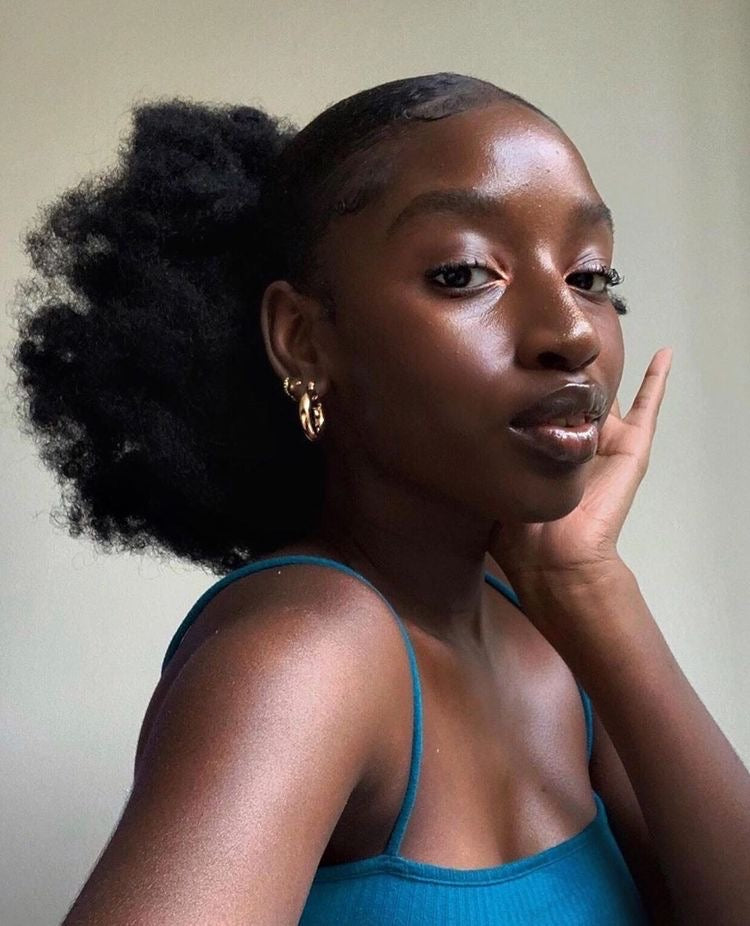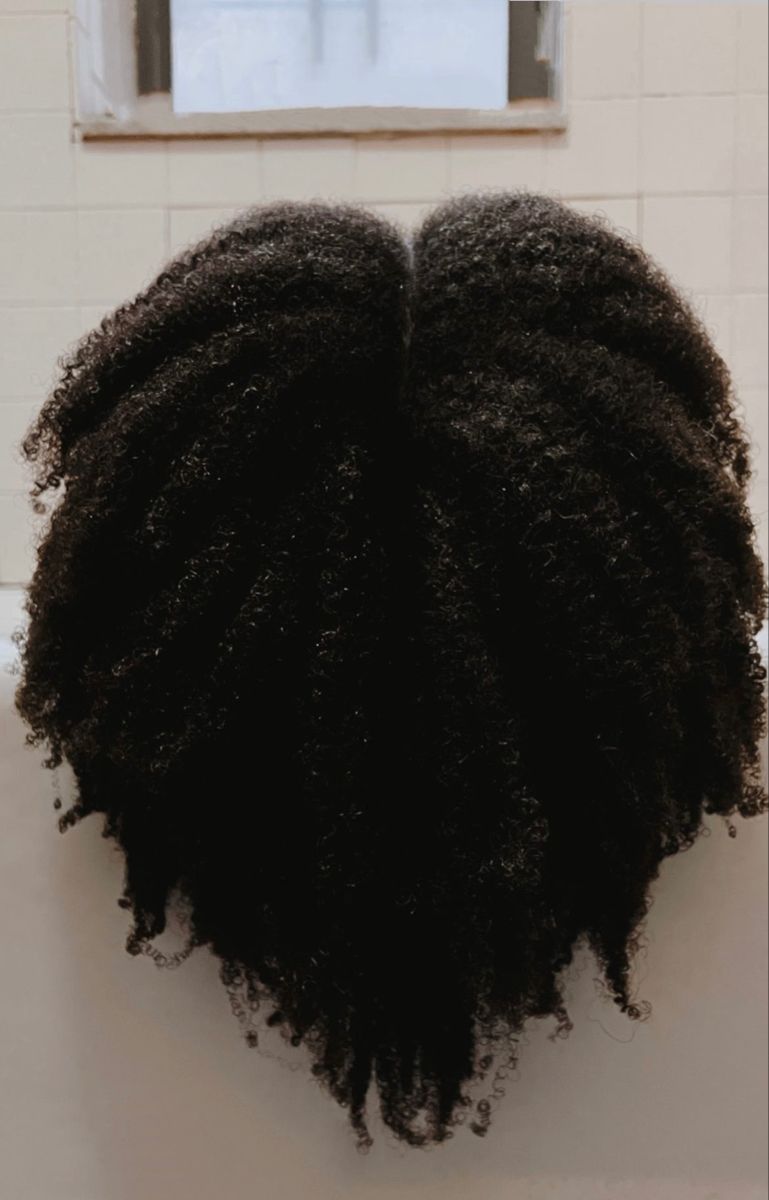The Best Oils for Natural Hair

In a world of viral content and hot topics - it's not surprising that hair oiling is starting to hit the mainstream. You can now find many online videos detailing and sharing the "Best Hair Oils for Natural Hair." These oils are cited to support and accelerate hair growth, and although the practice may seem new and exciting, hair oiling dates back thousands of years as a staple in South Asian culture. So, that may leave you questioning - what are the best hair oils for natural hair? And what are ways you can incorporate them into your hair regimen? Below are our top picks and worthy mentions for the best hair oils for natural hair.
What's the Purpose of Hair Oil?
The practice of Hair Oiling is an ancient Ayurvedic practice. Ayurvedic is a natural medicinal system originating in India, dating back over 3,000 years. There is a comprehensive understanding and tradition to the practice of hair oiling, but overall this practice is meant to emphasize the ritual of taking care of yourself. Hair oiling has many cited benefits, many revolving around anti-inflammatory, antifungal, and vitamin-enriched properties. When used consistently, the right hair oil strengthens hair from the inside out while simultaneously promoting hair growth, moisturizing hair strands, reducing split ends, and preventing dandruff. Hair oil hydrates the scalp and ends of the hair while promoting natural sheen and appearance. The benefits of hair oiling are endless. It's not a matter of "What is the Best Hair Oil for Natural Hair?" but more of which hair oil you can incorporate into your hair regimen to address your area of concern.
While reading our top picks, remember that you can choose an array of hair oils to support your or your child's hair journey. Our guide is not the source for all. Upon further research, you will find many hair oils throughout different cultures that have withstood the test of time - that may not be listed here. Allow this guide to pique your interest and go from there. Read on to learn about the best oils for natural hair.
The Difference in Oils: Essential Vs. Vegetable Oils
Not all oils are made the same - oils consist of two categories vegetable or essential. A cold pressuring process extracts vegetable oil from nuts, seeds, or cut flowers as a raw and oily substance. Essential oil is a fragrant substance. Extracted from various parts of plants with steam distillation.
Ensuring the Quality of Your Oils
As stated above, not all oils are made the same. This statement doesn't only apply to the distinction between Essential and Vegetable Oils; it applies to the quality of these oils as well. Quality suppliers sell their oils in tightly sealed, dark(amber) glass bottles as this protects the oils against sunlight, prolonging the life of the oil. Additionally, your oils should reflect the minimum ingredients on the product's label. Unless the oil in question is a blend - the product label should clearly state the name of the plant used to make the oil. Some oils even list the origin.
The Best Essential Oils for Hair
Essential oils are oils extracted from various plant parts
Be mindful when incorporating essential oils into your hair regimen, as they are very potent oils that can cause skin irritation, burn your skin, or cause allergies. We recommend diluting essential oils before application, and use carries oils such as vegetable oils listed further in this article before using essential oils.
Sweet Almond Oil
Benefits:
Sweet Almond Oil is rich in antioxidants, healthy fats, and vitamins like A, B, D, E, and Zinc. This oil is protective against UV damage and is referred to as a "repair" oil - transforming dull hair into a healthy hair. The oil creates a protectant around the hair, providing hydration and making hair more resilient to harsh factors. It provides intense moisture, which helps to prevent drying, flaking, and scalp tightness. Almond oil is also an emollient, which are oils that form a film over hair strands that can fill in gaps found within your hair. This property makes your hair smoother and results in a softer texture. Additionally, this makes hair easier to style and manage.
Why we love this oil:
We love this oil for its fragrance and lightweight. We find that this oil is very vital, as it brings life back into dull hair by forming stronger, hydrated strands.
Alternatives; Olive, Avocado, and Coconut Oil.
This sweet almond oil is preferred as it offers an excellent quantity-to-price ratio. We particularly like this brand, as the bottle is amber-colored, further preserving the oil. Additionally, it's a one ingredient product preferred when seeking out oils to ensure authenticity.
Peppermint
Benefits:
Beyond the sensational cooling smell it provides, peppermint oil is an excellent stimulant for hair growth and possesses many benefits. Peppermint has a stimulating ability caused by a compound called methol that helps to stimulate the scalp and improve your hair growth cycle. Peppermint causes the dilation of blood vessels, which promotes hair growth and prevents hair loss. This dilation of blood vessels further encourages blood circulation and, in turn, widens blood vessels, resulting in thicker hair follicles. Peppermint essential oil also consists of antimicrobial properties, which are beneficial to the hair and scalp because it helps balance the pH of your scalp, regulating oil production in those with oily hair.
Why we love this oil:
We love this oil for its fragrance and stimulating ability.
Alternatives: Tea Tree, Clary Sage, Lemon, and Rosemary Oil.
This is a blended oil, so although peppermint isn't the only ingredient listed on the bottle, it is compliment by many enriching oils. The application in addition to the dark color bottle , is what we love most about this product. You are able to easily apply the oil directly to the scalp, eliminating product waste and overuse.
Tea Tree Oil
Benefits:
Like many oils we've discussed thus far, Tea Tree oil has many uses. Tea tree oil is extracted from the Melaleuca alternifolia plant's leaves to moisturize and treat different hair and skin conditions. It is often recommended that the oil is diluted and used with a carrier oil due to its high concentration. Tea Tree oil is antifungal, anti-inflammatory, and antiseptic, making it great for treating dandruff and seborrheic dermatitis while remaining moisturizing. Due to its high concentration and properties, Tea Tree Oil removes excess buildup around the hair follicles. While this promotes hair growth by eliminating buildup - Tea Tree Oil is not considered a "hair growing" oil. Instead, it facilitates growth by aiding hair moisture and scalp health for hair follicles to flourish.
Why we love this oil:
We love this oil for its antifungal properties. This oil aids in the prevention of dandruff, alleviating scalp irritation and strengthening hair, resulting in a healthier scalp and scalp appearance.
Why we love this oil:
We love this oil for its fragrance and stimulating ability.
Alternatives: Peppermint and Rosemary Oil.
Our product recommendations:
Rosemary Oil
Benefits:
Rosemary has many uses. Native to the Meditarrian, Rosemary is a herb that can be used for healing and culinary purposes. Packed with amino acids, Rosemary can provide many strengthening, hydrating and restorative benefits to the scalp and hair when applied in the form of oil. Rosemary oil has been proven to contain anti-inflammatory and antibacterial properties. The oil also regulates sebum production, preventing moisture loss. In addition, research shows Rosemary oil promotes nerve growth and improves blood circulation promoting hair growth and preventing hair loss - this is particularly helpful for those experiencing hair loss and autoimmune disorders such as alopecia.
Why we love this oil:
We love this oil for its lightweight, fragrance, ease of accessibility(you can make this oil at home), and beneficial properties. This oil aids in the prevention of dandruff, alleviating scalp irritation and strengthening hair, resulting in less breakage and improving overall appearance.
Alternatives: Peppermint, Geranium, or Clary Sage Oil.
Our product recommendation:
Mielle Organics Rosemary Mint Scalp & Hair Strengthening Oil
Mielle Organics Rosemary Mint Scalp & Hair Strengthening Oil is the #1 Hair Treatment Oil on Amazon. In addition to Rosemary Oil, this oil combines a variety of oils such as Castor, Jojoba, Peppermint, Tea Tree, and many more, providing optimal benefits. We love this oil because it's lightweight and can apply to dry or wet hair without leaving a greasy film. It's a perfect blend of oils while preserving the lovely smell of Rosemary.
The Best Vegetable Oils for Hair
Vegetable oils, also known as fatty oils, are oils extracted from seeds or various parts of fruits. Often referred to as base oils or carrier oils, Vegetable oils are heavier, oilier, and greasier when compared to essential oils. Their purpose is to protect, so you will find that these oils often penetrate the hair shaft and provide comprehensive benefits to the hair.
Avocado
As a fruit, we understand that Avocado is rich in vitamins, lipids, and antioxidants - there's a reason why we refer to it as a superfood, so is it shocking that avocado oil provides just as many benefits to your hair?
The fatty acids in avocado oil are said to smooth breakage and seal moisture in your hair. Additionally, Avocado oil has many properties that protect hair from UV damage, environmental aggressors, and pollutants. Read more about environmental factors and how they affect your hair here. Avocado also contains Biotin - a vitamin believed to play an essential role in hair thickness and growth. Avocado oil is also said to repair and restore hair due to its ability to penetrate your hair shaft, promoting healthier, shinier hair. Also referred to as a carrier oil, Avocado is often paired with many essential oils such as peppermint, extracting optimal benefits.
Why we love this oil:
We love avocado oil because of its protective properties against environmental stressors and its lightweight. This oil has a delicate fragrance but provides optimal moisturization and restorative properties to your hair shaft.
Alternatives: Grapeseed, Flaxseed, Coconut, and Macadamia Oil
Our product recommendation:
La Tourangelle, Avocado Oil, All-Natural Handcrafted from Premium Avocados
As stated above, Avocado oil is often referred to as a carrier oil, which is why many products advertising Avocado oil for hair aren't available on the market. We love the premium avocados used in the blend of La Tourangelle's Avocado Oil. The Oil is lightweight, has a very minimal smell, and the pouring feature prevents leakage and excess oil spills.
Castor Oil
Benefits
Unlike many of the oils discussed thus far, few cited benefits of Castor oil are scientifically supported. Despite the lack of scientific research, this doesn't discourage users from religiously applying the oil and crediting it with improvements to their hair. Castor oil consists of a large amount of Ricinoleic acid, an unsaturated fatty, and hydroxy acid. This acid is why Castor is superior to other vegetable oils, as it is highly effective in penetrating and moisturizing the hair. Ricinoleic acid is also said to promote blood circulation. The large number of fatty acids found in Castor Oil also reduce inflammation in hair follicles. Like many oils, Castor Oil also consists of antibacterial and antifungal properties, aiding in the prevention of dandruff, alleviating scalp irritation, and promoting hair growth. You also may be familiar with Jamaican Black Castor Oil, a new approach to producing Castor Oil. Read about the difference between the two oils here.
Why we love this oil:
We love this oil for its moisturizing properties. Castor Oil is a very thick oil that is great for moisturizing and penetrating hair strands. Reach for this oil when your hair is feeling very dry and brittle. For this reason, we love to apply this oil to the ends and hair shaft. Long-term use will promote hair density and overall hair appearance.
Alternatives: Jojoba, Olive, Almond, Argan, and Grapeseed.
Our product recommendation:
Heritage Store Organic Castor Oil
Jojoba Oil
Jojoba is rich in vitamins and minerals such as Copper, Zinc, and vitamins C, B, and E that nourish the hair. Jojoba is similar to Castor Oil in that no research has been performed to support users' claims that the oil promotes hair growth. An undisputed fact of the oil is that it is genuinely moisturizing due to its oily composition. Compared to other essential oils, such as Peppermint and Rosemary - Jojoba is considered less effective in promoting hair growth, but that's not a reason to disregard this oil as a potential staple in your hair regimen. Jojoba is said to be "chemically and structurally similar to human sebum," a natural oil produced by glands on our scalp. Due to its moisturizing properties, Jojoba oil strengthens and promotes the overall manageability of one's hair. It's excellent for preventing and treating dandruff and thickening hair and has anti-inflammatory properties.
Alternative: Sweet Almond and Hazelnut Oil
Why we love this oil:
We love this lightweight oil for its moisturizing properties. This oil is excellent for hair that is thirsty but not dehydrated. It's a great oil to add the perfect sheen to styled hair or even hair worn in a protective style, such as a bun, as it's ideal for sealing moisture and eliminating the worry about weighing the hair down.
This is a one ingredient jojoba oil - which is what we particularly love about this product in addition to it's amber colored bottle. Also, it offer the best bang for your buck being a 16oz bottle.
Grapeseed Oil
Similar to Jojoba, Grapeseed is an excellent sealant. Rich in vitamin E, flavonoids, linoleic acid, and OPCs. OPCs are potent antioxidants that help prevent premature aging. These antioxidants also protect against UV damage. The Vitamin E and Omegas found within Grapeseed oil strengthen and restore hair. It is especially beneficial to those with over-processed, dry hair as it's an extreme hydrator that helps combat split ends and frizz. Grapeseed Oil is also said to prevent a DHT, a hormone that weakens hair follicles. It's incredibly lightweight, treats dandruff, and soothes the scalp.
Why we love this oil:
We love this lightweight oil for its anti-aging, UV protection, and hydrating properties.
Alternative: Avocado, Coconut, Canola, Rosehip, and Almond Oil
La Tourangelle, Expeller Pressed Grapeseed Oil
How to Use Hair Oil: The Application
As highlighted above, there are many benefits to incorporating hair oil into your hair regimen. Whether for stying or moisturizing, to reap all of the rich benefits these oils provide, we must understand all the different ways we can apply them.
Apply Oil via Pre-Poo
Pre-poo is a practice of preparing hair before shampooing. Shampoo strips our hair of natural oils. Thus pre-poo is a conditioning method to protect the strands from friction and drying. For a pre-poo, we want to use penetrating oils that penetrate the hair shaft and add extra nourishment to strands. Oils like Almond, Coconut, Olive, Castor, Jojoba, Argan, and Avocado oil are ideal; apply these oils to dry or damp hair. Start by working either of these oils from the ends-up section, and detangle the hair. You can heat the oil for optimal use and cover it with a Satin Bonnet, Scarf, or Shower Cap for an extended duration to promote penetration. You can incorporate a pre-poo in your hair regimen as often as you desire, dependent on your hair type and needs.
Apply Directly to Scalp
Most oils can be applied directly to the scalp; distinguishing between vegetable and essential oils will allow you to determine whether the oil will require dilution. Dilute essential oils with a carrier oil, like vegetable oils, as they are potent and can cause irritation. When selecting your carrier oil, take into account the absorption and odor of the oil - as you'd want an oil that helps absorbs well into your scalp and highlights the fragrance of essential oils. Popular carrier oils are coconut, Castor, Jojoba, sweet almond, Avocado, grapeseed, rosehip, argan, and black seed oil. Healthline provides the following dilution guide as a reference;
For adults:
- 2.5 percent dilution: 15 drops of essential oil per 6 teaspoons of carrier oil
- 3 percent dilution: 20 drops of essential oil per 6 teaspoons of carrier oil
- 5 percent dilution: 30 drops of essential oil per 6 teaspoons of carrier oil
- 10 percent dilution: 60 drops of essential oil per 6 teaspoons of carrier oil
For children:
- 0.5 to 1 percent dilution: 3 to 6 drops of essential oil per 6 teaspoons of carrier oil
Via healthline.com
Adding Essential Oils to your Shampoo and Conditioner
One of the most recommended ways to incorporate essential oils into your hair care regimen is to put your favorite oils in your shampoo and conditioner. Remember that many shampoo and conditioners in today's market already consist of many popular hair oils - so aim to use oils that will further enhance your product and address any concerns you may be experiencing.
Hot Oil Treatments for Hair: The Benefits
Incorporating hot oil treatment into your hair care regimen has many benefits as it nourishes hair from root to tip. Hot oil treatments,
- strengthen hair
- combat dryness
- provide dandruff relief
- reduced frizz
- result in fewer split ends
- increase blood flow in the scalp, promoting healthier hair
- hydrate hair
- increases hair sheen
Hot Oil Treatments for Hair: Do it Yourself
In a heat-resistant bowl or bottle, warm your desired oil or a mixture of oils in warm water or the microwave. Apply the oil from the root to the tip. An alternative approach is applying the oil directly to the hair and sitting under a steamer or hooded dryer. The heat allows the oils to penetrate deeply into your strands by opening hair cuticles; incorporating hot oil treatments in your hair regimen results in more manageable and softer hair.
Maintaining Hair Oil in Hair
Lastly, let's discuss oil retention. Since we have explored various oils with plentiful benefits and discussed how to introduce them to your hair through multiple methods, how do we keep our hair moisturized through these oils? You can incorporate many things into your hair regimen that will aid in the moisture retention of your hair. Our first recommendation would be a Satin Bonnet or Satin Durag. As a Children's Satin Bonnet and Durag line, we must emphasize how beneficial sleeping with either Satin or Silk Bonnets is when retaining hair moisture. In addition to a Satin Bonnet or Durag, you'd also want to ensure you follow a proper hair regimen and consider implementing either LOC or LCO styling methods and maintaining hair trims.
Rather than trying to identify the "Best Hair Oil for Natural Hair," more emphasis should be placed on your hair's unique needs. When selecting oils before implementing them into your hair care regimen, there are many factors to consider. Although you may be eager to incorporate the new oil trend - you must keep sight of your ultimate hair goals. Another factor to take into consideration is also your hair porosity as well as your preferred hair styling. Is your hair over-processed? If so, you may desire to incorporate grapeseed oil to combat all the different processing styles you rock. Experiment and find what works best for you and your hair.












Comments